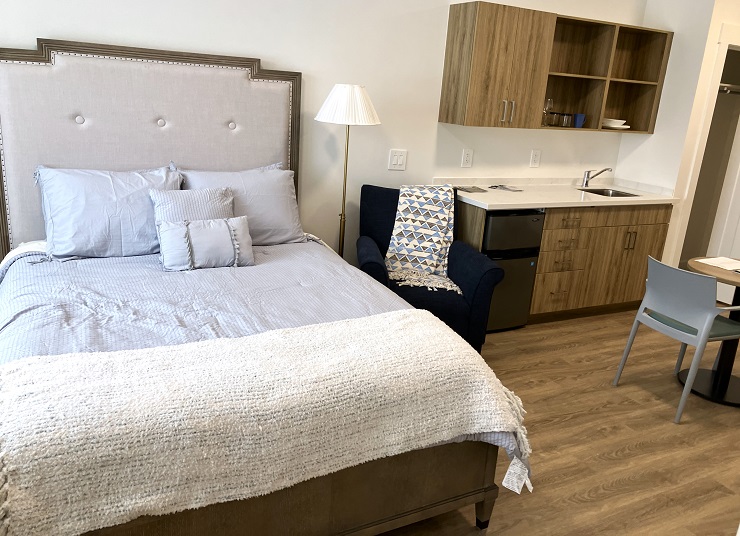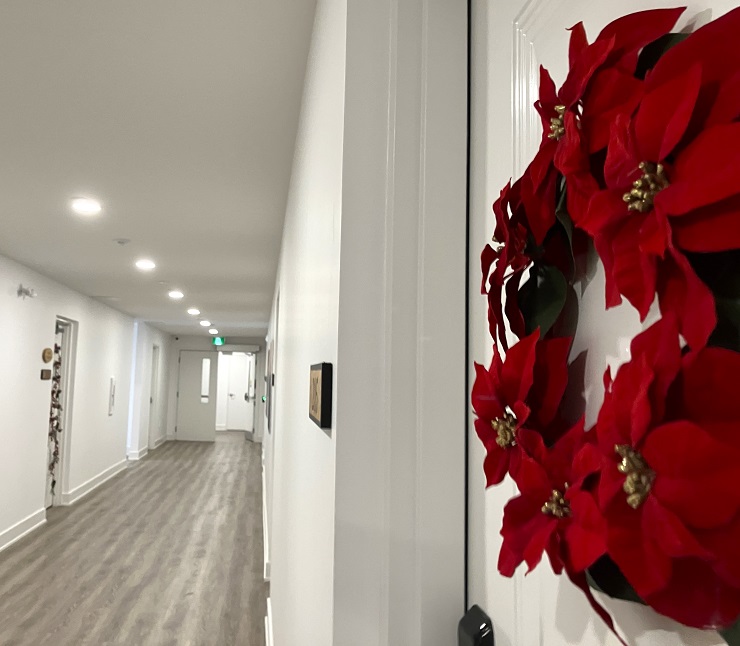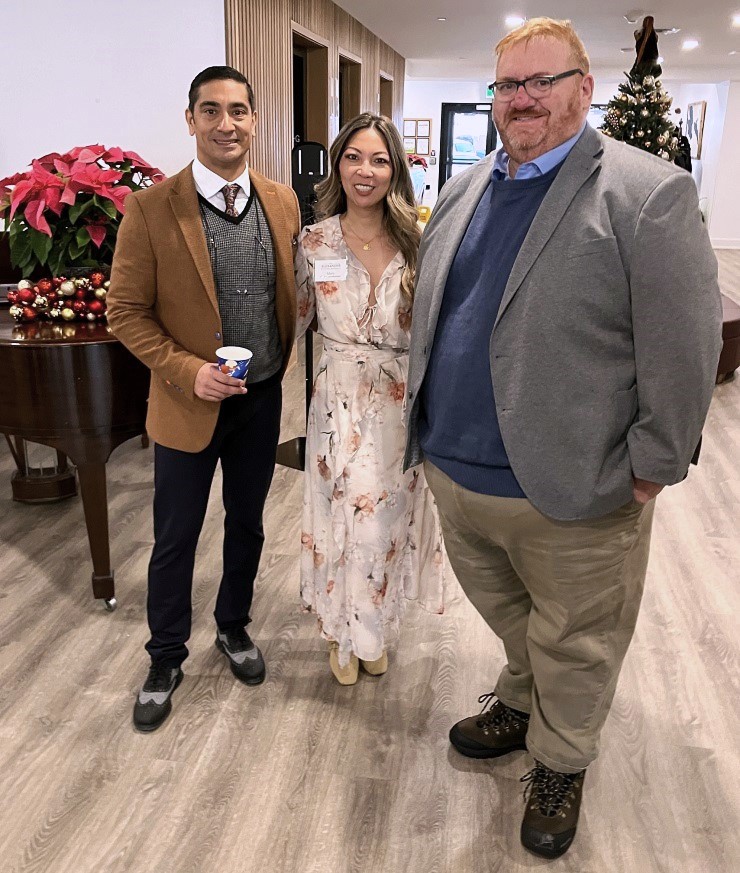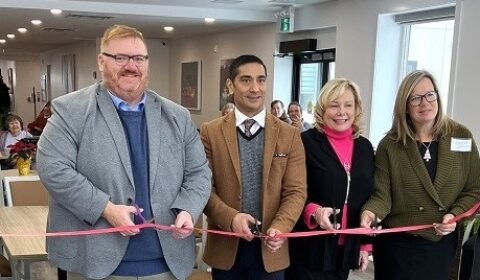ALEXANDER GETS 7 SHORT-TERM ‘TRANSITIONAL BEDS’ TO ‘ALLEVIATE PRESSURE’ ON HOSPITALS
Mark Clairmont | MuskokaTODAY.com
GRAVENHURST — A three-way partnership with MAHC and the province will open seven short-term transitional care beds at the new Alexander Muskoka Residence.
At an announcement here at the home this morning, owner Leonard Ohja, MPP Graydon Smith and Muskoka Algonquin Healthcare CEO and president Cheryl Harrison said it will allow patients to receive care in between a hospital stay any future longer term care solution.
The Ontario government is paying for the beds at the private sector residence rather than providing the cost at either South Muskoka Memorial Hospital or Huntsville District Memorial Hospital. It’s part of provincial program begun during COVID.
And it’s similar to a deal MAHC has had with Muskoka Hospice at Andy’s Place in Port Carling for palliative care beds.

The MAHC transitional residents do not require acute care and may be in their new residence for weeks or possibly months before another suitable location is found for them.
The arrangement may also allow for two more “surge” beds, said co-owner and nurse practitioner Marie Ohja, to free-up the hospitals if they become over-run by keeping patients closer to their homes rather than finding beds elsewhere in the province as happened during the pandemic.
Harrison said they “represent a critical solution for patients who are medically-ready to leave the hospital, but are unable to return to their prior living situation. So these beds give people about 90 days to ensure that we can get them the right care and right place as they transition and wait for the next step in their journey.
“Patients transferred here will continue to receive care from their local primary care practitioners or nurse practitioner (if they have either). This also ensures continuity of care making sure people are getting the right care in the right place.”
She said the impact will “not only alleviate pressure on (MAHC’s) acute care beds, but also provide patients and their families with a supportive environment during a transitional period.”

Harrison added the program “demonstrates how innovation and partnerships can address challenges in our health care system. And we need to continue to do more.”
She said it’s not too dissimilar to how people with hip and need surgery recover privately outside of hospitals.
Leonard Ohja, a nurse, called it a “momentous occasion…. Our goal is to be the best home for older adults in Muskoka — and dare I say the world.”
One that requires “collaboration, innovation and above all care compassion, love and respect.”
The Alexander is about halfway filled, with several couples. There are 102 rooms with many reserved in advance.
Ohja said “by working hand and hand, the Alexander and Muskoka Algonquin Healthcare are addressing a critical need, ensuring that the hospital resources are available for those who need those most, while offering a transitional space for all. … It ensures we will remain a dependable pillar of support for our community. Our shared vision is we are exceptional people providing exceptional care. The initiative reflects this…. Together we are setting new standards.”
Harrison agreed, in her opening remarks, saying “this is how aging should take place.”
Smith, too, said he was “awe struck” at the Alexander, which opened last June.
He said the Ohjas had the “foresight” to include new services.
Smith also gave a shout out to Gravenhurst residents for getting through last weekend’s storm and to all the front-line workers, plow operators and emergency personnel who did “great” work and are still helping people survive the storm of 2024.

Harrison said after that while the health of the hospitals is good right now in the midst of flu and cold season. She said there are “always a few lingering respiratory cases. But we don’t have any outbreaks (of COVID) yet.”
She the transitional program is meant for hospital patients with ALC (alternative level of care) needs.
“And their destination may be a couple of months away, so we are able to move them here.”
Harrison said currently MAHC has between 30-35 ALC bed patients — but that varies day to day.
“But they’re not all waiting for long-term care; some are waiting for home care in their home or a retirement home. We have a lot of retirement homes that are subsidized. But there’s waiting lists for lots of beds.”
She said this will assist “in terms of patient flow” freeing up beds in their hospitals by transitioning patients to the Alexander, which will allow others stranded on the emergency room gurneys to be admitted upstairs to hospital beds.
While MAHC will always have some ALC patients, “I don’t think we will have as many.”

Said Harrison: “We’re going to have people come in who are aging and need our services. They might not become ALC, but there are still going to be older people who come in with an acute illness and then they need a few days of what we’ve talked about as rehab, reactivation. Then we can prevent them from becoming ALC patient. That’s our goal. You’re still going to have some folks for whom there’s never going to be enough long-term care or other things in the community. Our goal is to have less. But more people that are not going to be ALC — but are still in hospital.
“We will still have people who have needs but they won’t be given that label.”
Harrison said ALC hospital stays can last weeks and months for some, including those who may be designated early in their admission who have no post hospital stay plans or options. Such as people who suddenly have a stroke with nowhere to go.
“There are some who come in and quickly we make them ALC, because a lot of people don’t have plans in place and all it takes is one health crisis, like a major stroke. And you use to be independent and now you can’t go home. That can be identified very early in the acute phase. And depending on the complexity of the ALC some people need really specialized type of care.
“This place we’re able to bring some people with memory issues, because it’s a closed unit. So often times those are the ones who stay longer, because many of our long-term care facilities don’t have” sufficient enough care for that.
Regular post surgical patients, she said, should still be able to cared for in hospital.
“I think we’ll probably be able to manage surgical patients who need rehabilitation. Some of them have to go to a specialized facility for rehab for hips and knees. But in future we will be able to take care of them ourselves.”
So orthopaedic operation then rehab elsewhere?
“Or they will go up to our Huntsville site to our rehab and reactivation beds.”

EMAIL: news@muskokatoday.com
30 years of TRUSTED ‘Local Online Journalism’
SINCE MAY 20, 1994
Twitter: @muskokatoday, Facebook: mclairmont1
SUBSCRIBE for $30 by e-transferring to news@muskokatoday.com
Mail cheque to MuskokaTODAY.com Box 34 Gravenhurst, Ont. P1P 1T5
And include your email address to get stories sent to your inbox

